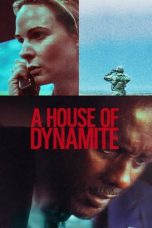The Wave (2008) Movie Review: A Powerful Exploration of Fascism and Group Dynamics
The Wave (2008), directed by Dennis Gansel, is a gripping German drama that explores the rise of authoritarianism and the power of group dynamics through a fictionalized account of a high school experiment. Based on real events from the “Third Wave” social experiment conducted in the 1960s in the United States, the film offers a compelling and thought-provoking narrative about the allure of fascism and the dangers of unchecked power.
Plot Overview
The film is set in a German high school where teacher Rainer Wenger (played by Jürgen Vogel) is tasked with leading a week-long project on autocracy. To demonstrate the principles of totalitarian regimes, Wenger introduces an experimental social movement called “The Wave.”
At first, the experiment is intended to be a harmless way to illustrate the mechanisms of dictatorship, such as conformity and authority. However, as the students become increasingly invested in “The Wave,” the movement starts to take on a life of its own, fostering an environment of exclusion and aggression.
The experiment quickly spirals out of control as the students’ enthusiasm for the movement leads to the emergence of fascistic behavior, intolerance, and violence. Wenger struggles to manage the situation, but the consequences of the experiment become increasingly dire, affecting both the students and those around them.
Performances and Characters
Jürgen Vogel delivers a strong performance as Rainer Wenger, portraying the teacher’s descent from a well-intentioned educator to a figure struggling with the ramifications of his experiment. Vogel’s portrayal captures the complexity of Wenger’s character as he grapples with the unintended consequences of his actions.
The film features a talented ensemble cast of young actors, including:
- Felicitas Woll as Lisa, a student who becomes one of the leading proponents of “The Wave.”
- Max Riemelt as Tim, who is initially skeptical of the experiment but later becomes a key figure within the movement.
- Christian Hocke as Marco, whose involvement in “The Wave” reveals the impact of the experiment on different individuals.
The performances of the young actors effectively convey the transformation of their characters from ordinary students to fervent members of a dangerous social movement.
Direction and Cinematography
Dennis Gansel’s direction ensures that the film remains tense and engaging, with a focus on the psychological and social dynamics of the experiment. Gansel’s approach to the material is both thoughtful and provocative, providing a nuanced exploration of how easily individuals can be drawn into extremist ideologies.
The cinematography, by Florian Ballhaus, complements the film’s intense atmosphere with its stark and dynamic visual style. The use of close-ups and fast-paced editing captures the emotional volatility of the characters and the growing sense of unease as the experiment unfolds.
Themes of Power, Conformity, and Extremism
The Wave delves into several key themes, including:
- Power: The film explores how power can corrupt and the ways in which authority figures can influence and manipulate individuals. Wenger’s experiment demonstrates the ease with which power dynamics can shift and lead to destructive outcomes.
- Conformity: The experiment illustrates the human tendency to conform to group norms and the dangers of suppressing individuality in favor of collective identity. The students’ willingness to follow “The Wave” without question highlights the impact of peer pressure and social influence.
- Extremism: The film addresses the rise of extremist ideologies and the consequences of allowing such movements to gain traction. The rapid escalation of “The Wave” serves as a cautionary tale about the seductive nature of authoritarianism and the potential for violence and intolerance.
Impact and Reception
The Wave received critical acclaim for its powerful storytelling and relevant social commentary. The film’s ability to provoke thought and discussion about the nature of fascism and the susceptibility of individuals to extremist ideologies was widely praised.
On IMDb, the film holds a strong rating, reflecting its success in engaging viewers and sparking conversations about its themes. Its impact is evident in its continued relevance as a tool for discussing the dangers of authoritarianism and the importance of vigilance in safeguarding democratic values.
Streaming and Availability
For those interested in watching The Wave, the film is available for streaming on platforms such as Amazon Prime Video and can be rented or purchased on digital platforms like Apple TV and Google Play Movies. Its compelling narrative and thought-provoking content make it a valuable film for those interested in social psychology and political history.
Conclusion
The Wave (2008) is a powerful and thought-provoking film that explores the dynamics of power, conformity, and extremism through a high-stakes social experiment. With its strong performances, engaging direction, and relevant themes, the film offers a compelling examination of the ways in which individuals and groups can be drawn into dangerous ideologies. Whether you’re interested in social psychology or political history, The Wave provides a gripping and educational cinematic experience.
















